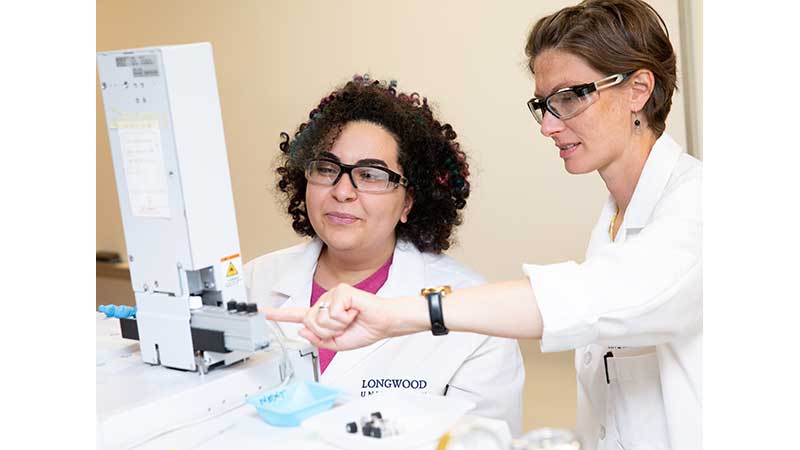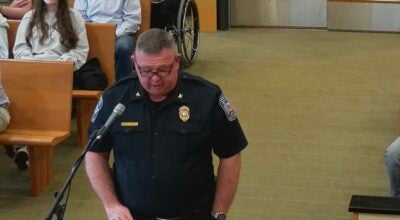New tests for arson investigations
Published 11:37 am Wednesday, September 11, 2019

- Longwood University student Sarah Elsakr, left, works with Longwood Associate Professor of Analytical Chemistry Dr. Sarah Porter this past summer as part of the PRISM program. (Photo courtesy of Longwood University)
Longwood University chemistry major Sarah Elsakr’s PRISM research project this summer could have been ripped from an episode of the forensic crime drama television series “CSI: Crime Scene Investigation,” a recent Longwood press release highlighted.
Officials in the release noted that Elsakr worked as a rising senior with Dr. Sarah Porter, Longwood associate professor of analytical chemistry, testing burned carpet samples to determine which petroleum product was used as the ignitor. The goal was to research alternative testing methods for use in arson investigations, as well as other areas of forensic and environmental chemistry.
The project was part of Longwood’s signature PRISM program, which stands for Perspectives on Research In Science & Mathematics. The release continued by citing that PRISM is an eight-week summer research initiative that pairs students with faculty members for intensive paid research work in a variety of STEM fields.
“We are doing a lot of different things with petroleum products,” Elsakr explained in the release. “We are diluting them using different solvents. Then we run them through instruments to tell us what is inside of them. Then we take that data and use math to figure out the pattern that’s going on within the sample.”
Officials caught up with Elsakr to find out more about her PRISM research and what else she did in Farmville this summer. The release presented the resulting interview:
Q: How did you get involved in PRISM?
A: Dr. Porter told me about the PRISM program and encouraged me to apply. My mom has always encouraged me to try new things and put myself out there. I applied, and I got in! I’m a transfer student, and this is my first real research experience. I’ve found that I really enjoy working in a laboratory. This is such a different experience from taking a lab class. We don’t know all of the answers because we are testing and trying new things as we go along.
Q: Tell us about your project.
A: The analysis of petroleum products and ignitable liquids is a major area of research in forensic and environmental chemistry and in the petroleum industry. Forensic chemistry is used in arson investigations to determine what ignitable liquid was used to deliberately start a fire. Environmental chemistry deals with the environmental concerns that stem from the use of petroleum products — like oil spills, tailpipe emissions and contamination from gas stations. In both cases, it is helpful to have quick and easy methods of analyzing an unknown petroleum product and identifying whether it’s gasoline, diesel, kerosene or something else.
Right now, there is one testing method that dominates the field of petroleum analysis. What we are doing is testing and exploring alternatives to the widely used gas chromatographic analyses. Specifically, we are using spectroscopic methods, including Fourier transform infrared spectroscopy (FTIR) and X-ray fluorescence spectroscopy (XRF). These are instruments that tell us the organic and inorganic makeup of a sample, and they are not commonly used now.
Q: What’s your favorite part of your research?
A: I like all of what we’ve done. I like how I get to learn how to use different instruments as well as creating different types of samples to test. To do that I take the different petroleum products and dilute them. Then we put them in water samples and on carpet samples. We will burn a carpet sample and see what’s inside it. I really like testing the carpet — that’s forensic science. If there was an arson case, the investigators would collect pieces of carpet or upholstery that they could test and identify if there was an accelerant used and, if so, what type.
Q: Have you had any success?
A: Yes, we have. We are using chemometrics, which means looking for mathematical and statistical patterns in the data we collect. We can use those patterns to figure out what petroleum product is present. So far, we’ve seen success in using this to analyze our data.
Q: What are your career goals or plans for after graduation?
A: My plan is to graduate and go into the chemical industry and work in a laboratory. I really like trying to figure things out. This experience has confirmed that’s what I want to do. It’s just a matter of what industry I’m most interested in pursuing. Entry-level jobs in the chemistry field are very plentiful. I’m fortunate because participating in PRISM research will put me head and shoulders above other graduates coming out of college with bachelor’s degrees. Having this level of practical lab experience will give me a leg up over other candidates who haven’t had this type of hands-on experience.
Q: On to the important questions: What is your favorite thing to do around Farmville this summer?
A: I’m rooming with two other PRISM students, and one of them really enjoys going out and looking for fun things to do around Farmville. There’s an ice cream truck we’ve found this summer. We’re going out and doing things you wouldn’t expect to be in Farmville.
Q: What is your favorite thing to eat in D-hall?
A: I love their sugar cookies and chocolate chip cookies! I also like the mashed potatoes and nachos.




